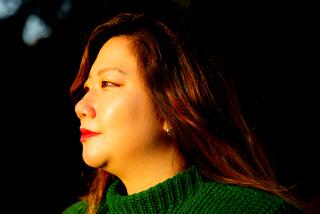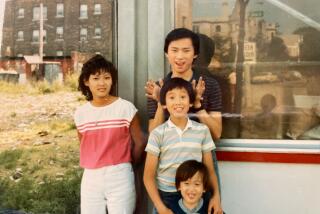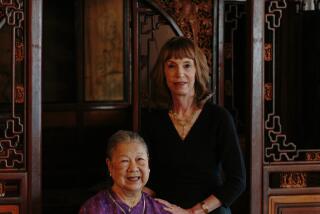Criticism of author Ping Fu underscores punch of Internet
- Share via
SAN FRANCISCO — Plug “Ping Fu” and “liar” into Google these days and the combo yields more than 6,300 hits. (See, also, “big fat liar,” “lie-fabricating machine,” etc.)
But it wasn’t always that way.
A child of China’s Cultural Revolution, Fu arrived in the U.S. three decades ago and went on to build a successful 3D-modeling technology company and earn a seat on the Obama administration’s National Advisory Council on Innovation and Entrepreneurship.
Then she did something that shifted her reputation, quite possibly forever: She wrote a memoir.
“Bend Not Break: A Life in Two Worlds” received glowing reviews when released last December. But soon the online critics amassed.
Some were in China. Most were immigrants whose families had experienced the Cultural Revolution and found her accounts improbable. Strangers, they united with common purpose.
And so began the dissection of Ping Fu — a campaign that has underscored the use of the Internet as an attack tool.
Fu’s critics call themselves “truth seekers” intent on exposing her “lies.” Yet just as her memoir contains inaccuracies (to which she has admitted) so too does the vitriolic cyber-trail.
“There has to be a motive,” Fu, 55, said at home here this summer — an article on Internet bullying sitting on her table — before legal advisers suggested she stop commenting on the controversy. “But what is it?”
::
The initial concept for the book was a collection of business tips, but Fu’s publisher wanted the professional story mixed with her more personal one.
Her memoir tells it this way: Fu was raised in Shanghai by an aunt and uncle. One day in 1966, as Mao Tse-tung was setting the Cultural Revolution in motion, Red Guards showed up to return the 8-year-old to Nanjing, the city of her birth.
She and her younger sister, Hong, were housed in a dormitory at the Nanjing University of Aeronautics and Astronautics, where their father once taught. Their parents were considered to be “black elements” — her mother was an accountant and her father had ties to the National Party — and had been sent to the countryside. So Fu raised her sister alone.
The girls were forced to denounce their lineage. At age 10, Fu was raped by a group of teens on the soccer field.
She eventually earned a seat at Suzhou University and chose China’s one-child policy as her thesis topic. When her research revealed a rural epidemic of female infanticide, she was brought to the authorities’ attention, detained for three days and advised to leave the country.
She arrived in the U.S. in 1984 on a student visa, with little money and limited English. After studying in New Mexico, California and Illinois, Fu went to work at Bell Laboratories and the National Center for Supercomputing Applications before co-founding Geomagic.
Driving her success was a philosophy gleaned from her uncle about adaptability and compassion: “Bamboo is flexible,” he told her, “bending with the wind but not breaking … It suggests resilience, meaning that we have the ability to bounce back from even the most difficult times.”
::
Barely two months after the book’s release, critics flocked to Amazon.com to demand that Fu declare nearly every aspect of her story a fiction.
Helping shepherd the initial effort was Fang Zhouzi, whose campaigns as a “liar hunter” have earned his microblog more than 13 million followers. It mirrored what in China is called the “human flesh search engine.” Individually they had little power, but collectively detractors were able to boost criticism of Fu to the upper reaches of the blogosphere.
Their doubts touched on topics in the memoir large and small:
Fu said Red Guards had driven her in a military van, but critics said chances that the teens would have had access to a vehicle were minuscule. Fu described seeing suffocated babies discarded in plastic bags. Skeptics noted such bags were rare then in rural China.
And a sexual assault by teenagers was “very unlikely if not impossible,” poster Z.C. wrote online, because “boys at that time might not know how to do sex.”
In June, Suzhou University officials joined the fray, saying they had no record of Fu’s infanticide research or detention.
Her critics obtained Fu’s old resumes from public universities and research institutions in the U.S., culling them for inconsistencies — and found some: Early versions claim a bachelor of arts degree from Suzhou University (Fu said that her book makes clear she withdrew in her final semester); one lists a master’s degree from Suzhou (Fu said it’s likely a typo).
What stirred the most outrage was the memoir’s assertion that vaginal exams were conducted on all female Suzhou University students to ensure they were not pregnant. Fu conceded she was not aware of such exams occurring on campus, but said a law prohibiting pregnancy among women who already had one child had prompted pelvic checks elsewhere.
The practice spurred many late-term abortions, she said, and she wanted to draw attention to it.
Amid the criticism, the memoir’s publisher, Portfolio, cited Fu’s author’s note, which said that many of the events occurred “more than forty years ago and I’ve tried as much as possible to verify the facts.”
“Sometimes, despite everyone’s best efforts, minor mistakes appear in nonfiction books,” Portfolio president Adrian Zackheim said in a statement. “Whenever they are brought to an author’s attention they are corrected in future printings. Ping has already acknowledged several of these, and if any additional corrections are required, of course those will be made as well.”
A paperback edition with fixes came out last week.
::
But for her critics, there is no turning back.
Some have remained anonymous. “Take her down by all means!” wrote someone with the handle “Sick Liar.”
Others who have revealed their identities said in interviews that they were motivated by the belief that their adopted homeland relies on an honor system that Fu violated.
Their convictions have at times led them astray.
Seeking proof that Fu had worked as a UC San Diego teaching and research assistant, Fallbrook attorney Albert Wang was told there were “no records” responsive to his request, as personnel information is maintained for just five years.
“Ping Fu fabricated her work experience,” Wang triumphantly concluded.
Soon after, Fu tracked down the professor she had worked for and shared their email exchange with The Times. “How could I forget,” he wrote warmly of their time together.
Amy Kristin Sanders, an attorney and associate professor at the University of Minnesota’s School of Journalism & Mass Communications, said the explosive criticism seems powered in part by the importance of “reputation and honesty” in Asian culture.
Adding to the effect is the Internet’s power to pull together otherwise-isolated individuals.
“These are people who may in their own geographic communities never express these kinds of views,” Sanders said, “but when they see the momentum of hate that comes out on the Internet, it empowers them.”
::
Family members have corroborated Fu’s basic story.
The beloved “Uncle W.” in Fu’s memoir said he visited her at the Nanjing dorm and heard her account of rape and the taunts that followed.
“During the Cultural Revolution, Ping’s father and mother were punished for a long time,” Wan Ao wrote in an email to The Times, “so Ping had an unfortunate life, too.”
Wan recalled that after Fu went missing during in her senior year at Suzhou University, she returned frightened, insisting on withdrawing from school. He helped her to leave China “so she would not be sent to exile or be persecuted.”
Fu’s sister, Hong Bischoff, recalled their life in Nanjing, lining up in the cafeteria to say “how bad our parents were” and eat bread “green with mold.”
And after the assault, Bischoff said, her sister “was crying in the bed for many days. After that, she didn’t like to go out. She carried it alone for so long.”
To Fu, the whole experience has had an odd sense of familiarity.
“In the denunciation sessions, if you said something wrong they would hit you and tell you to say it all again,” she said. “They are using [the Internet] as a bulletin board to shame me. In the Cultural Revolution, they put it on the wall.”
More to Read
Sign up for Essential California
The most important California stories and recommendations in your inbox every morning.
You may occasionally receive promotional content from the Los Angeles Times.














